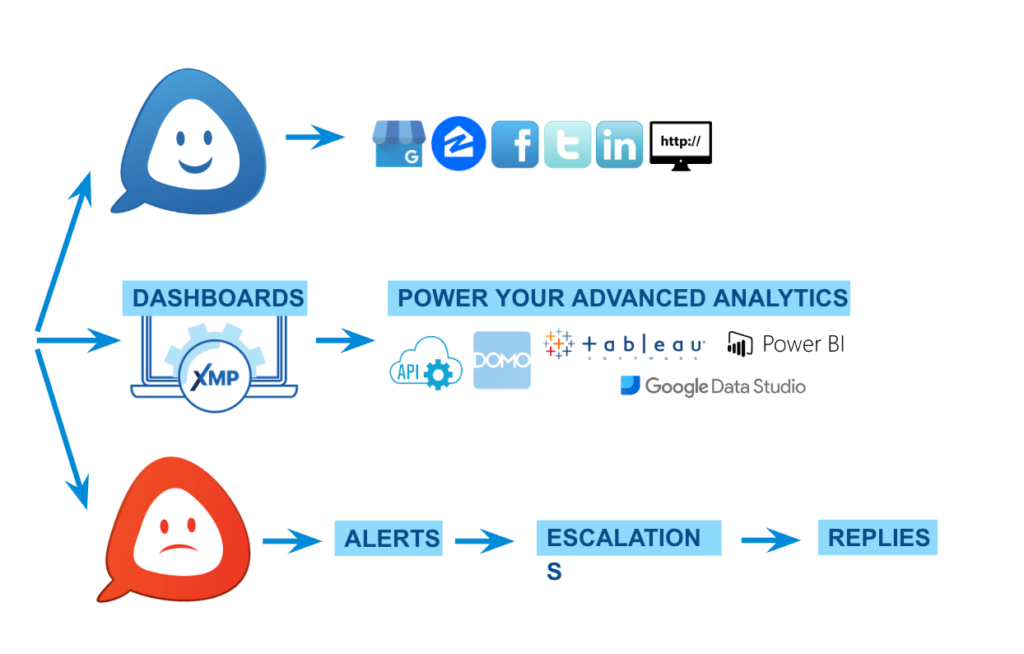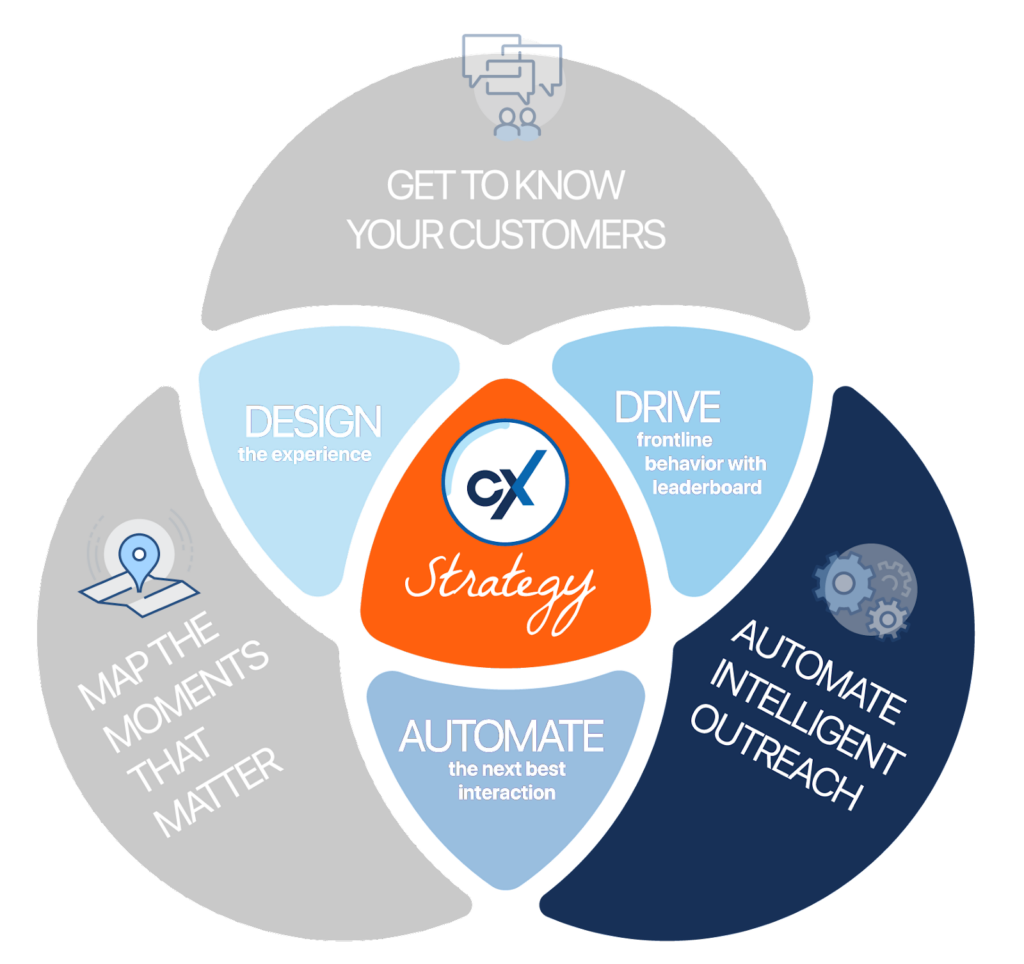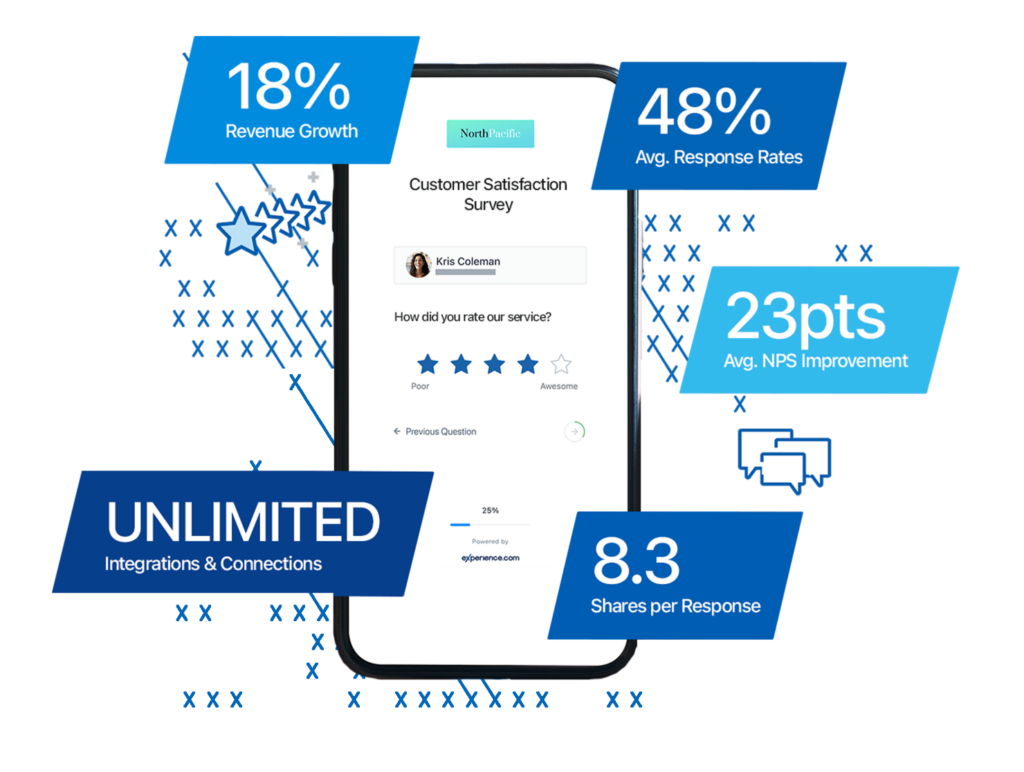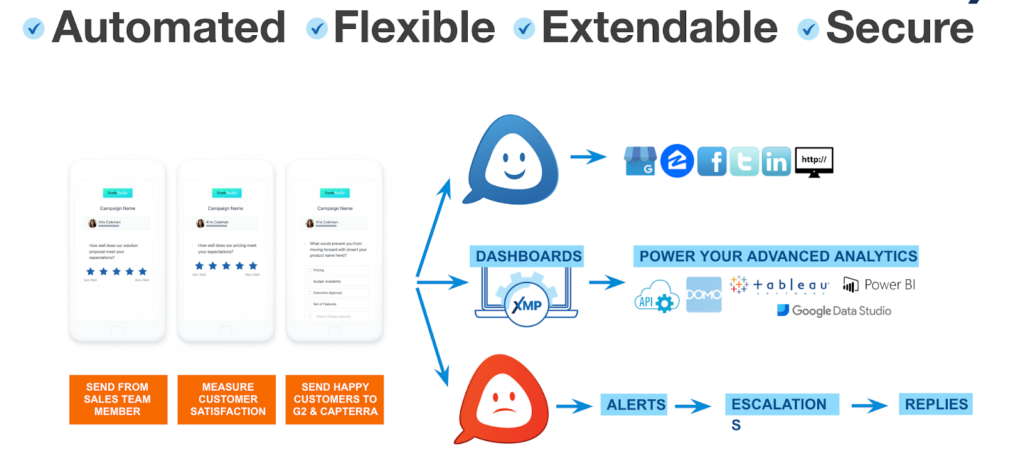If you want your business to succeed and flourish, you must deliver an extraordinary, distinctive, and exceptional Customer Experience (CX). Managing customer expectations, however, may be costly and time-consuming. CX today is demanded across multiple channels, including reviews management, social media, websites, and in-person interactions, and enhancing CX for your company has become essential.
| 86% of consumers, according to Forbes, are willing to spend more for goods and services in exchange for a superior customer experience. | 75% of consumers prefer brands to customize messaging, offers, and experiences, according to a 2023 study on Shopify. |
Customers create so much data that it is impossible for humans to manually process it. By investing in automation, your Experience Management Solution, whether customer or employee experience, can do the heavy lifting for you! By collecting, organizing, and analyzing all of this data in REAL time, an automated platform helps you to segment and tailor your customer data and communications and disseminate them widely with little to no manual interaction. Additionally, a good experience management strategy can automate and increase lead conversion, audience targeting, and fosters client trust and loyalty. The value of creating a great customer experience is far-reaching — it has the power to significantly boost retention, reputation, and revenue.

Why is automation important?
Automated campaigns activate active listening, customer insights, and data-driven decision-making.
Automation eliminates the need for manual work and the use of multiple tools or extensive resources by scheduling Campaigns (with or without Surveys) that are triggered by specific moments in the customer or employee journey.
Customer Experience Automation is essential to modernize your service delivery and operations because it allows customers to skip the long wait. This technology can aid with cost-cutting, quality enhancement, and improved customer satisfaction. Additionally, it can aid businesses in better comprehending trends in how they communicate with customers.
Businesses may improve their reputation and shorten the time it takes to handle concerns by automating the customer experience. It simplifies business procedures and frees up time for trickier consumer encounters. Essentially, automation enables companies to create a fantastic CX, better understand their consumers, respond to customer grievances faster, and implement a more customer-centric business strategy.
In today’s day and age, customers have high expectations, and a successful business depends on providing a positive customer experience. It is essential to automate your customer service procedures, as a result.
- Automated surveys enable a business to respond to customers’ needs immediately while the experience is still fresh in their memory.
- By knowing that a customer is dissatisfied with an interaction or experience within the proximity of the event, you are better equipped to address their concerns and retain the customer.
- Leverage the data to boost employee performance and implement appropriate measures to foster continuous improvement.

Outcomes Automation can have for your Business:
- ‘Set and Forget’: Automation, by definition, reduces manual effort, thus enabling your employees to focus on and pursue more pressing issues which need immediate attention. In other words, with the power to automate, your company can become a steady machine of customer support. This also allows you to track your customer interactions and get real-time insights.
- Cost Cutting: Automating various processes like follow-up sequences and automated surveys can help your company save money on personnel hours. By delegating routine jobs to automation and spending more time on activities that offer value for their consumers, organizations can use automation to boost their profitability.
- Higher Efficiency and Productivity: Setting up automated tasks can reduce the possibility of human mistakes and lead your overall productivity levels to skyrocket. With error minimisation and multi-tasking, automation can help speed up the process and increase productivity.
- Customer Satisfaction: All of these benefits will ultimately lead to increased levels of customer satisfaction, thus helping your company to retain existing clients and attracting potential ones. Automation helps your organization improve its customer service, leaving you with happier, more satisfied customers.
The Evolution:
The Net Promoter Score, or NPS:
Previously, before Google, before Netflix and before Amazon, NPS was the measurement standard for customer experience. NPS is a customer loyalty and satisfaction measurement taken from asking customers “how likely they are to recommend” your product or service to others on a scale of 0-10.
However, there were several problems with it:
- It doesn’t do anything, since the data informs the process AFTER the problem has already happened.
- It doesn’t measure the interaction, making it hard to drive behavior.
- The results are easy to manipulate, since some employees will remind only the happiest customers to take the survey.
- The measurement is not a reasonable predictor. In fact, many studies show that roughly 10% of customers who are labeled “Detractor” actually negatively impact the brand.
- It doesn’t seem to be a reliable metric.
- It doesn’t tell you where to focus.
Long Form Surveys:
Long Form Surveys are the most common way of collecting customer feedback are survey forms with a set of questions that are usually sent in an email. The average survey has 15 to 20 questions and takes about 5 minutes to complete.
Yet, they too come with several hazards.
- Long form surveys have a low response rate and a high abandonment rate. This is because customers have a limited attention span. They will only focus on a survey for a few minutes before they get tired, frustrated, or bored, and ultimately abandon the exercise altogether.
- They are not timely, since most customer surveys come days after an experience.
- They do nothing, and can not be used to fix customers’ experiences as they happen.
- They also come with both positive and negative bias. If a customer has a great overall experience, they are likely to answer all questions more positively, and vice versa.
- With these long form surveys, it is also true that unhappy customers are more likely to complete surveys than happy customers.
Experience Management is not a list of individual problems and solutions. It is a single puzzle. When it is put together properly, each piece works far more efficiently than it possibly could as an individual solution.
The Role of XMP:
The Experience Management Platform or XMP, reinvents how companies capture the experiences of customers and employees (at the right moments), act on those experiences, and broadcast those experiences to build social proof and drive profit. Thoughtfully designed products and features make up the core.
Prior to using the XMP, many of our mortgage customers, for example, likely used a paper slip in closing packets, or even worse, sent personalized emails one-by-one to each of their clients to request feedback from borrowers. The automation that brings in transaction data to send Campaigns at the right moments is just the beginning of the simplification that the XMP offers to its customers.
The power of the platform core is the ability to replicate a business’ structure and hierarchy, so they are able to power every tier and individual in their organization with experience data, analysis, benchmarks, reputation, and behavior — all through automation. Whenever a user interacts with a customer, each of these customer moments is referred to as a transaction in our XMP. Each transaction record is captured through one or more of these systems that can be connected to via the ingestion setup.

Virtuous Cycle:
Employee and customer experiences are intrinsically connected — we know that employee behavior can significantly influence a customer’s experience and vice versa.
We’ve developed a platform that allows a company to capture employee-level feedback during every meaningful moment on the customerʼs journey.
We then leverage that feedback to drive behavior and improve operations by automatically sharing happy customer sentiments to social media and inviting them to share secondary reviews on other industry-specific sites. Unhappy customers are automatically sent through a predetermined complaint resolution workflow.
The sharing of positive feedback to social media allows organizations to build their online reputation and gain more loyal customers while the complaint resolution workflows create an opportunity to change detractors into promoters.
With the personalized feedback that is collected, employees are also individually empowered — boosting retention of the best employees and enabling coaching for those who need it the most…
…and so the cycle continues!
Phases of Action:
The Virtuous Cycle can be broken down into 3 phases of action: Collect, Analyze, and Act. The XMP is a business tool that turns these phases into tangible business initiatives.
Collect — The XMP gathers customer feedback through personalized and mobile-optimized survey campaigns. We do this by connecting to the operational systems that the organization is already using to track their business via API or simple file transfers.
Analyze — One of the XMP’s key differentiators is the ability to replicate an organization’s hierarchy within the platform. The data that is collected from the survey campaigns feeds into the reputation profiles of the individual employee, their branch, their region, and the national brand.
Dashboards provide clean, easy-to-consume visualizations of customer sentiment while leaderboards encourage friendly competition between employees.
All of that data from each tier of your organization fuels overall company growth, while boosting individual employee-level reputation. Win locally, grow exponentially.
Act — The Experience Platform connects with your HR system, so you can incentivize and reward excellent customer experiences and offer coaching to employees who show room for improvement.

Make every experience matter more.
We believe that experience is everything. Amazing experiences create customers for life, and poor ones destroy brands and businesses. That’s why Experience.com has built the world’s most impactful Experience Management Platform (XMP) with features to drive operational and behavioral change, in real-time, during the moments that matter.
The XMP delivers impactful business outcomes including increased customer satisfaction, brand loyalty, online reputation and visibility, as well as, improved employee engagement and compliance – making every experience matter more.











